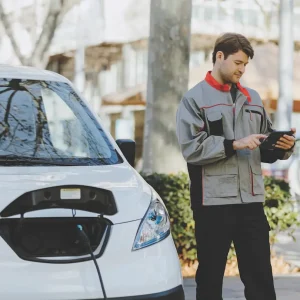Historically fleet telematics systems relied on a punitive, approach and retrospective feedback, now Lightfoot delivers a pioneering approach by empowering drivers to improve hence saving fuel, lowering emissions. and even reducing accidents Lightfoot’s system has been adopted by over 250 fleets, including Tesco, Asda, Virgin Media, Integral, Southern Water, and Equans.
So how does it work? A unique in-cab coaching device helps to train drivers in real-time so that they can adjust their driving style as they go. This is coupled with a driver rewards App that encourages better driving through weekly scores, league tables and competitions. In addition, 10% of Elite drivers win up to £200 every week in Lightfoot’s Driver Lottery.
All existing solutions were focused on reacting to historical data and issuing retrospective corrections. Lightfoot connects to the vehicle’s engine using advanced technology to understand how it’s being driven, i.e. revs, gear selection and engine load. This allows it to deliver training based on actual driver performance, with the patented psychological ‘nudge’ system of audible warnings and traffic lights on the display, giving drivers the tools to correct their driving and stop incidents from occurring. In electric fleets specifically, the system tackles several of the key challenges that come with transitioning to EVs, including how to deploy EVs within the total fleet, charge expense management, and best charging practice. This ensures that mixed fleets still have full control of all their vehicles and can manage the differing costs effectively.
Lightfoot was born out of the realisation that a fleet will only ever be as good as its drivers are, no matter how high-tech the vehicles are. Improving driving behaviour is the key to creating safer roads, maximising efficiency, lowering costs, and reducing emissions. The introduction of rewards ensures this happens on a long-term basis as drivers remain engaged, and the App also allows for functional tasks such as vehicle checks, ensuring maximum safety. For fleet managers of combustion-engined vehicles, EVs, or mixed fleets, a full fleet management and telematics suite is provided as part of the Lightfoot system. This enables fleets to accurately monitor the progress of their drivers and see the reductions in dangerous driving, fuel consumption, and CO2, whilst tracking increases in range for their electric vehicles. Still with the environmental theme, Lightfoot’s telematics is proven to reduce 15% of CO2 emissions, as well as cutting harmful NOx and NEE, as endorsed by the University of Bath. Lightfoot is endorsed by a wide variety of insurers and brokers because it’s proven to reduce at-fault accidents by 40%, as validated by Allianz Insurance Plc. This is due to the increased awareness of drivers as they’re travelling, and the formation of safer driving habits over time. This leads to lower insurance premiums and fewer claims for its clients, one of whom, Acorn Mobility Services had an annual claims summary of £180,000 before using Lightfoot. After two years with the technology, this reduced to £13,000.
Customers are provided with a free trial to demonstrate the benefits of Lightfoot before they sign up, consisting of a month collecting data only, before going live to provide driver guidance. This process illustrates how Lightfoot addresses road safety, emissions, and running costs.
Likewise, by introducing a gentler style of driving into fleets, the technology can have a significant impact on operational costs. On average, Lightfoot reduces fuel consumption by 15% and has a similar effect on EV range. In addition, it even reduces wear rates on tyres and brakes.
Highly Commended: MAXUS

With the increasingly rapid charge toward EV fleets, the Chinese LCV manufacturer, MAXUS has teamed up with LEVL to create the MAXUS Intelligence Onboard telematics system. It provides detailed data-driven information, aiming to optimise fleet productivity and safety. The MAXUS Intelligence Onboard system operates on the full range of electric vehicles from MAXUS with LEVL’s existing electric vehicle expertise, whilst utilising the established Geotab’s electric vehicle telematics.
Customers have access to a wealth EV data to support their fleet operations, which includes state of charge, energy used, energy cost, live GPS tracking and charging data to help improve EV range efficiency. In addition, MAXUS will take the data supplied through the system to receive vehicle fault codes, energy usage and driving styles, to make improvements to future MAXUS electric vehicles based on the EV data taken from Intelligence Onboard.


